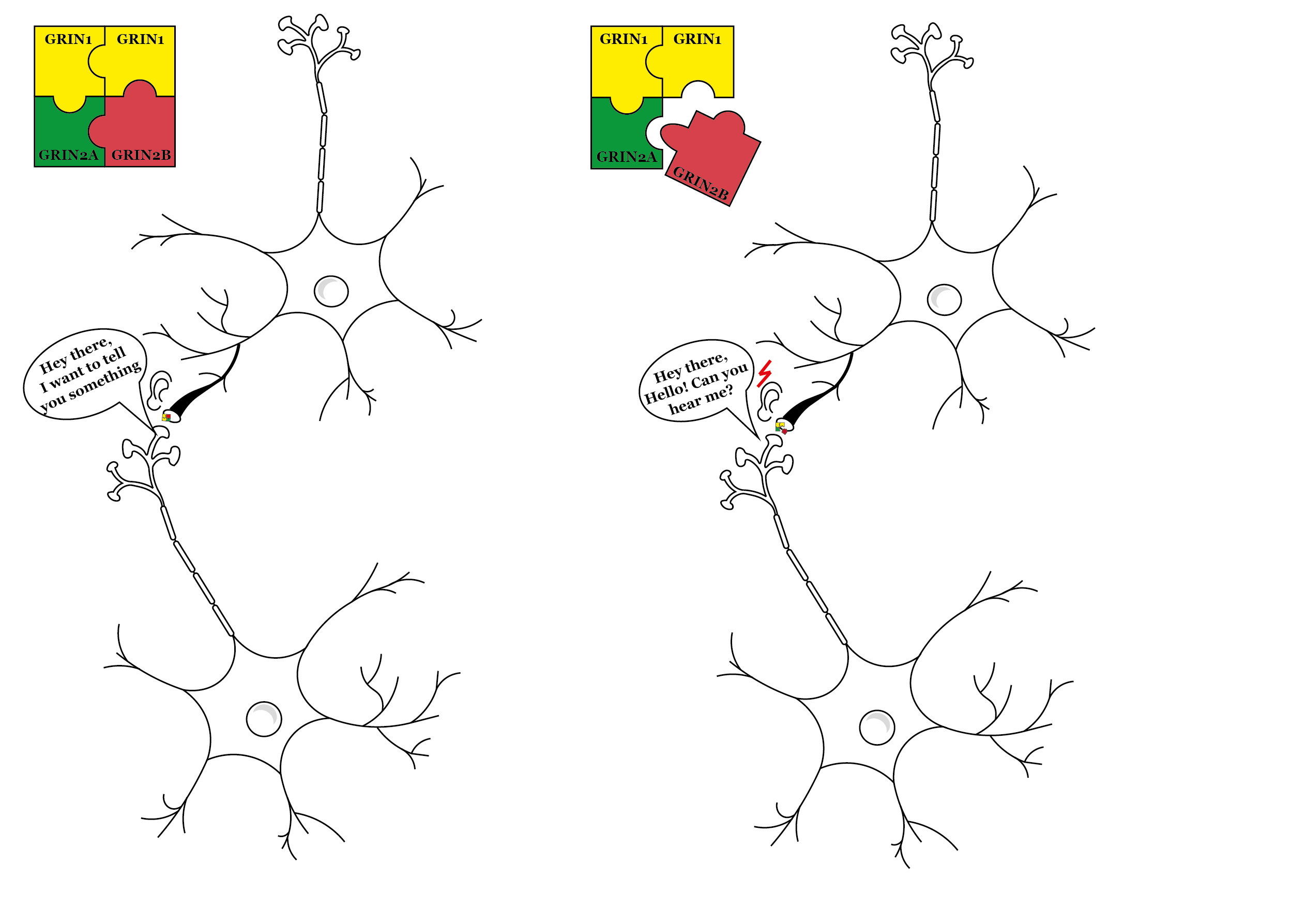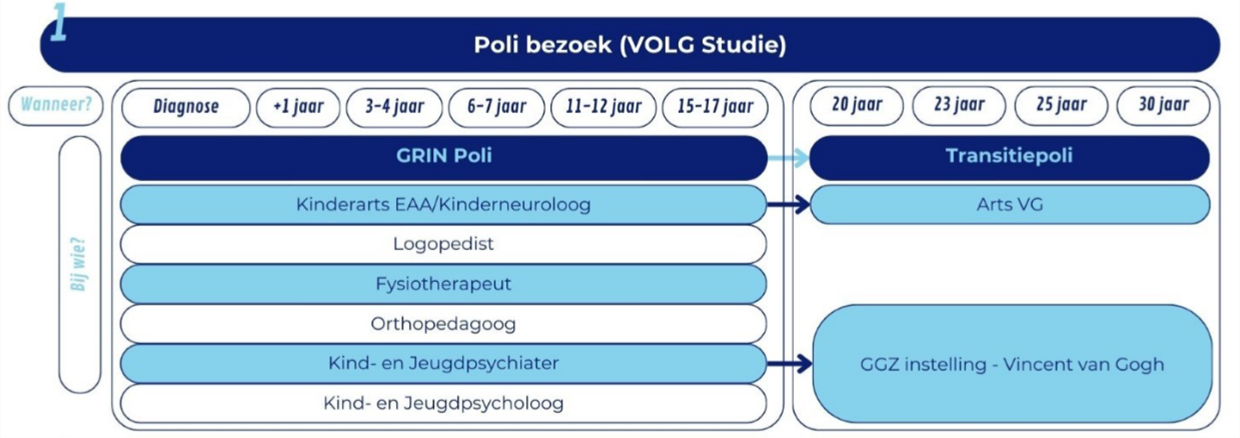What is GRIN Syndrome?
GRIN Syndrome is a rare genetic disorder, which is associated with epilepsy, developmental delay, learning and behavioral problems and low muscle tone. Problems with speech, growth, nutrition and motor skills also occur.
What Causes GRIN Syndrome?
GRIN is the abbreviation of "Glutamate Receptor Ionotropic N-methyl-D-Aspartate". The "recipe" for the production of the GRIN protein is stored in our genetic material, the DNA. The DNA contains the genetic code for our hereditary characteristics, the genes. The DNA is packed in chromosomes. There is a family of 7 different GRIN genes (GRIN1, GRIN2A, GRIN2B, GRIN2C, GRIN2D, GRIN3A and GRIN3B).
The GRIN1 protein, together with 3 other GRIN proteins, forms the so-called NMDA receptor. This receptor is very important for the communication between your brain cells. When your brain cells communicate, one brain cell releases a substance, glutamate, which binds to the NMDA receptor of the other brain cell. This activates the NMDA channel and opens it. The receiving brain cell can then process the obtained signal. This process is essential for remembering and processing new information ("synaptic plasticity"). You could therefore see the receptor as the earpiece of the brain cell. Due to an error in one of the GRIN genes, the NMDA receptor no longer works not good enough or is too active, which can both lead to various problems.

How common is GRIN Syndrome?
The GRIN Syndrome is a very rare condition, with an estimated few dozen patients in the Netherlands. Because it was discovered quite recently, it is not known exactly how often it occurs. GRIN Syndrome occurs in both boys and girls.
Every month, on one Wednesday and one Friday afternoon, a consultation hour is reserved for GRI(N) patients. The visits to this consultation hour are mainly intended to get a good picture of children with a mutation in the GRI genes. In addition, we provide specific advice to stimulate the development of your child and provide you with background information about GRI disorders. It is therefore important to mention that it is not the intention that we take over the medical care of your child from his/her already involved pediatrician or pediatric neurologist.
During your visit
The appointments for the GRI(N) consultation are scheduled at fixed ages. In the image below you can see these ages. Usually the first appointment is shortly after diagnosis. The following year we always schedule an extra appointment. When visiting the GRI(N) consultation, you will visit the following specialists, shown in the image below.

The consultation of the pediatrician and pediatric neurologist is planned together at the Pediatric Neurology outpatient clinic. During this conversation you can discuss the most important problems and concerns, as previously discussed by telephone with the nurse consultant.
The physiotherapist and speech therapist will perform various tests to see how your child is developing. You may recognize some of the tests from previous appointments with your own physiotherapist or speech therapist. Our experts will look at the results with a great deal of experience and provide customized advice. They have already seen several children with GRI(N) syndrome and can therefore provide specific advice for the care of your child. In addition to the appointments with your own local healthcare providers, it is valuable to also make an appointment with the physiotherapist and speech therapist at ENCORE.
Transition clinic
When your child turns 18, the care will be transferred to adult care. This also applies to the expertise care from ENCORE. To make this transition easier, there is a period of overlap. This is called the transition. During the transition, the doctors can prepare you and your child well for the transition of care.
The GRI(N) expert team has recently been able to see adult clients through the physician for the mentally handicapped (physician VG) Dr. Krab from the Hartekamp Group. She helps all adults, even those without a mental handicap. In addition, the mental health institution Vincent van Gogh is affiliated with the expert team. As an organization, they focus on care for people with mental health problems.
Pediatrician Genetic & Congenital Disorders and coordinator: Dr. Danielle Veenma
Pediatric neurologist and coordinator: Drs. S.M. Koudijs
AVG-physician: dr. Lianne Krab
Pediatric physiotherapist– Koen Dekkers, Mandy van Drunen
Speech therapist - Cindy Navis
Educational psychologist – Nienke Bouw
Child- and youth psychiatrist – Drs. Leontine ten Hoopen
Click here to go to the contact form or mail yourself to: grin.encore@erasmusmc.nl
In order to provide the best possible care to patients with a rare condition, it is essential that global knowledge about the condition is gathered. Nationwide, centers of expertise have been set up to stimulate care for rare disorders and to gather knowledge. For the formal recognition of an expertise center by the Ministry of Health, an important condition is that the expertise center gathers, analyzes and shares knowledge through publications. These can be publications in scientific journals, but also treatment guidelines for health care professionals or information brochures for patients or caregivers. We optimize care and research within ENCORE through standardized follow-up and close collaboration between doctors and researchers. That way, we can ultimately develop better treatments for rare conditions. You may therefore be asked to participate in research. Participation in research is always on a voluntary basis. The data obtained is stored and analyzed in an anonymous form. All research has been approved in advance by an ethics review committee.
To learn more about research into GRIN Syndrome at ENCORE, click here
Click here to visit the website of 'Stiching GRIN syndroom'.
There is an international organization founded by parents of GRIN patients CureGRIN Foundation, click here to go to the website.
For more information about the different GRIN mutations, click here (only in English).
